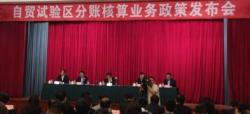Shanghai FTZ free trade account finally unveiled – what will it bring to enterprises and individuals?
Posted on July 4, 2014Another article on the FTZ – free trade account (that’s a lot of ‘frees’ for a heavily restricted process) follows below. As you can tell from the feel, this is a translation from a government media produced article. It is still quite enlightening however.
http://www.yicai.com/news/2014/06/3948230.html
The FTZ free trade account finally unveiled – what will it bring to enterprises and individuals?
The free trade account (FT account) finally became operational in Shanghai Free Trade Zone (FTZ) yesterday and Bank of China (BOC) Shanghai Branch set up the first FT account. All this indicates the official kickoff of a separate accounting system – Free Trade Accounting Unit (FTU) of Shanghai FTZ.
“Like opening a brand new bank”, said Zhang Xinyuan at an after-meeting interview, who is the head of the international settlement of BOC Shanghai Branch. He said the new accounting system covers all the traditional banking business like deposits, loans, remittance, L/C and letter of guarantee services, but in a different mechanism from outside-FTZ onshore market. “It’s as much as creating a new market.”
What benefits will enterprises and individuals enjoy?
With a FT account, enterprises in FTZ can enjoy all the same traditional bank services. So what on earth are the advantages?
Take the exchange rate as an instance, Zhang Xinyuan said, banks will adopt a FTZ exchange rate for their FTU in the FTZ. This FTZ exchange rate is different from that of outside-FTZ onshore market or offshore market. But seen from the first transaction, the FTZ rate is more close to the offshore rate. “It’s possible to create a third exchange rate in FTZ (apart from the current onshore and offshore rates). Because market asymmetry exists, enterprises should have more choices.”
 The deposit and lending rates are always the most concerns for companies. Zhang Xinyuan revealed that the deposit rate in FTZ remains the same, but companies now have easier access to foreign loans. Loan interest rate in FTZ is generally lower than that of outside-FTZ onshore market. What might excite companies more is that business loans borrowed inside FTZ are allowed to pay off business loans borrowed outside of FTZ as long as they are borrowed through accounts under the same name, according to PBOC. Zhang also explained, assuming that the annual interest rate for business loan in FTZ is 5% and outside of FTZ is 5.5%, and a company has existing loans borrowed outside of FTZ in line with the required standards of PBOC, as long as the holding length of the outside-FTZ loans meets the minimum duration of 6 months, the company can repay the more expensive loans straight away and enjoy the benefits of lower rate in FTZ.
The deposit and lending rates are always the most concerns for companies. Zhang Xinyuan revealed that the deposit rate in FTZ remains the same, but companies now have easier access to foreign loans. Loan interest rate in FTZ is generally lower than that of outside-FTZ onshore market. What might excite companies more is that business loans borrowed inside FTZ are allowed to pay off business loans borrowed outside of FTZ as long as they are borrowed through accounts under the same name, according to PBOC. Zhang also explained, assuming that the annual interest rate for business loan in FTZ is 5% and outside of FTZ is 5.5%, and a company has existing loans borrowed outside of FTZ in line with the required standards of PBOC, as long as the holding length of the outside-FTZ loans meets the minimum duration of 6 months, the company can repay the more expensive loans straight away and enjoy the benefits of lower rate in FTZ.
“Operating costs of real economy will go down. This is to make use of the price asymmetry of the two markets, it’s the type of ‘limited penetration’ with a clear direction”, said Zhang Xinyuan.
In addition, non-resident enterprises that used not to have access to certain services now can enjoy these services through FT account. Previously, only a few banks in China can conduct offshore business through their licenses, but this will change by a recent statement of PBOC, at least all the local banks in Shanghai can run FT account business and provide services to eligible enterprises.
Enterprise will not be the only party to benefit from the FT account as many non-resident individuals are also very interested in it. According to Zhang, FT account is also open to eligible non-resident individuals. However, as the details of cross-border investment activities yet to be introduced, non-resident individuals can only be involved in general business under current account which makes little difference with outside-FTZ operations.
In fact, for enterprises and individuals, the key to bear in mind is that the FT account system is the foundation to realize free convertibility under Capital Account in the next stage. FT account system will promote innovations on investment, financing and FX activities which in turn will benefit companies and individuals even more. Take individuals as an example, once PBOC and CSRC issue the related details, individuals can participate in QDII2 scheme through FT account and invest into foreign capital markets like Hong Kong and US Stock Market.
7 Banks have passed the risk management assessment
Yesterday, 7 banks that have passed qualified risk management assessment — BOC Shanghai Branch, ICBC Shanghai Branch, CCB Shanghai Branch, SPDB, BOS, BOCom Shanghai Branch, CMB Shanghai Branch, signed agreements with some enterprises to set up FT account. BOC, ICBC, CCB, SPDB and BOS, these 5 banks which have access to PBOC Shanghai system have been approved of running FT account operation first. BOC Shanghai Branch opened the very first FT account, which marks the official kickoff of the FT account operation.
 The FT account is the core of PBOC’s paper “Opinions on the Financial Support to the Construction of the China (Shanghai) Free Trade Area”. It’s an important institutional arrangement to explore freer investment, financing and foreign exchange activities, to further open the financial market and guard against financial risks. Upon the launching date of the FT account, eligible FTZ-based and non-resident enterprises can open FT account in local financial institutions that have been accepted to access PBOC system in Shanghai. The FT Account offers 5 account types: FT account for FTZ-based enterprises (FTE), FT account for Non-resident enterprises (FTN), FT account for FTZ employed individuals (FTI), FT account for FTZ employed foreign individuals (FTF) and FT account for financial institutions within FTZ (FTU). FTZ-based and Non-resident enterprises are able to make cross-border capital settlement for regular and direct investments through FT account. With policies on investment, financing and FX being gradually issued, the FT account is seen to provide strong support for a wider range of free trading, investment and financing activities in the FTZ.
The FT account is the core of PBOC’s paper “Opinions on the Financial Support to the Construction of the China (Shanghai) Free Trade Area”. It’s an important institutional arrangement to explore freer investment, financing and foreign exchange activities, to further open the financial market and guard against financial risks. Upon the launching date of the FT account, eligible FTZ-based and non-resident enterprises can open FT account in local financial institutions that have been accepted to access PBOC system in Shanghai. The FT Account offers 5 account types: FT account for FTZ-based enterprises (FTE), FT account for Non-resident enterprises (FTN), FT account for FTZ employed individuals (FTI), FT account for FTZ employed foreign individuals (FTF) and FT account for financial institutions within FTZ (FTU). FTZ-based and Non-resident enterprises are able to make cross-border capital settlement for regular and direct investments through FT account. With policies on investment, financing and FX being gradually issued, the FT account is seen to provide strong support for a wider range of free trading, investment and financing activities in the FTZ.
About Caterer Goodman Partners
Caterer Goodman Partners is a Shanghai based wealth management firm established with a clear vision to provide a new level of personalized financial planning services for expatriates in Asia. Our financial advisors provide guidance for our clients in all areas of investment, specialising in managed accounts, money-market funds, retirement planning and alternative investments. At Caterer Goodman Partners, we offer our advice and experience to provide low cost, tax-effective and simple solutions to match our clients’ interests.
About Owen Caterer
Since graduation Mr Owen Caterer has worked with the Queensland Premier's Department in Trade Facilitation and then as a financial adviser in Shanghai from 2005 until 2010. He then rose to Senior Adviser, then Business Development manager and then to Chief Investment Officer responsible for portfolios to a value of US$280 million across Asia. Following that Mr Caterer left to found his own firm with a partner in the financial advisory and wealth management area. This focused on developing China and Asia's first fee-based financial advisory (rather than commission-based). This has grown to now have 8 staff and and managing almost US$35 million for clients throughout Asia. This business success was recognized as a finalist in the 2013 ACBA in the Start Up Enterprises category and are one of a small number of foreign managed firms to have a full asset management license in China. Owen has also been active in the community volunteering for the Australian Chamber of Commerce in Shanghai and acting as the Vice-Chair of the Small Business Working Group (2012-2014) and as the Co-Deputy Chair of the Financial Services since 2013 until the present. They have continued to grow their business and have now been selected as a small group of companies who are platinum members of the Australian chamber of commerce. The achievement they are most proud of is their efforts to reform the financial planning industry in China and push it away from a hard-sales commission driven model to a more ethical management fee and long term customer service model. Owen has a Graduate Diploma of Applied Finance from the Securities Institute of Australia of which he was a member as a Fellow of Finance for many years and also has an undergraduate degree from Griffith University in International Business. Owen's interests are tennis, running and his wife and two children. He speaks fluent Chinese, first arriving in China in 1997.
Tags: 2014, Caterer Goodman, China, China Expat Money, Expat, Financial Advisor, FT Account, FTA, FTU, FTZ, Investment, New RMB exchange rate, Owen, Owen Caterer, RMB liberalization, Shanghai, Shanghai Expat, Shanghai Free Trade Zone
Categorised in: Investing in China, Investments

